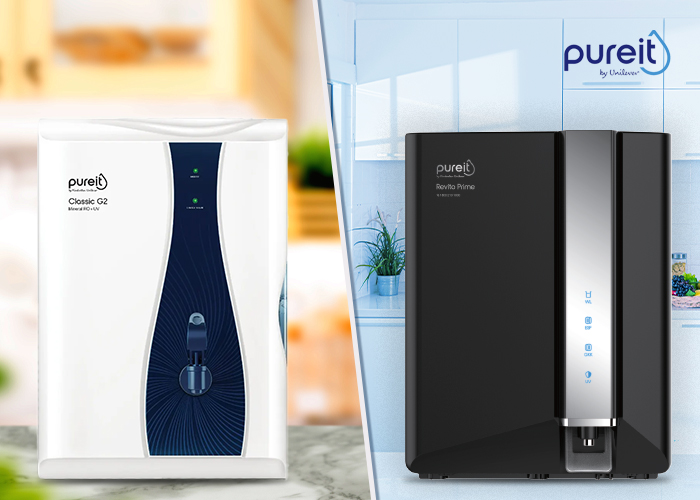Drinking water that is clean and safe is critical to our health and well-being. In the quest for purified water, we have relied on traditional filters and witnessed the emergence of smart water purifiers. While both aim to provide us with clean water, there are significant differences between the two options. This blog explores the key differences between traditional filters and modern water purifiers, shedding light on their filtration capabilities, maintenance requirements, cost considerations, technological advancements, and convenience factors. By understanding these distinctions, you can make an informed decision when selecting the right water purification system for your needs.
Traditional Filters
Traditional filters have been used for decades to remove impurities from water. These filters generally consist of porous materials that physically trap sediments and large particles. They are commonly found in pitchers, faucet attachments, and countertop systems. Traditional filters are affordable and easy to install, making them accessible to a wide range of users. However, their effectiveness is limited compared to modern water purifiers. While they can improve the taste and odor of water, they may not effectively remove harmful contaminants such as bacteria, viruses, heavy metals, or chemicals. Traditional filters require frequent maintenance, including regular cleaning and replacement of filter cartridges to prevent clogging and ensure optimal performance.
Modern Water Purifiers
Modern water purifiers incorporate advanced technologies to deliver superior water purification. They utilize a combination of filtration methods such as activated carbon filters, reverse osmosis, UV disinfection, and multi-stage purification processes. These advanced purifiers can effectively remove a wide range of contaminants, including bacteria, viruses, chemicals, heavy metals, and even pharmaceutical residues. The use of innovative technologies ensures that the water you consume is of the highest quality. However, modern water purifiers may come with a higher initial cost compared to traditional filters. Additionally, some systems require electricity to operate and may need periodic maintenance and filter replacements to sustain their performance.
Key Differences Between Traditional Filters and Modern Water Purifiers
- Filtration capabilities: Traditional filters primarily remove sediments and large particles, while modern water purifiers employ advanced technologies to eliminate a broader range of contaminants, including bacteria, viruses, chemicals, and heavy metals.
- Maintenance requirements: Traditional filters need frequent cleaning and filter cartridge replacements to avoid clogging, whereas modern water purifiers typically require periodic maintenance, including filter replacements, to ensure consistent purification.
- Cost considerations: Traditional filters are generally more affordable upfront, but they may not provide the same level of comprehensive purification as modern water purifiers. Despite their higher initial cost, modern purifiers offer long-term cost savings by providing reliable and thorough water purification.
- Technology and innovation: Traditional filters rely on simpler and older technologies, while modern water purifiers incorporate advanced filtration and purification methods to achieve optimal results. These innovations enhance their ability to remove a wide range of contaminants effectively.
- Convenience and ease of use: Traditional filters are often simple to set up and operate, requiring no electricity or complex installation. On the other hand, modern water purifiers may have additional features such as automatic monitoring, filter change indicators, and integrated water dispensers, adding convenience to the purification process.
Choosing the Right Option for Your Needs
Selecting between traditional filters and modern water purifiers depends on various factors. Consider the water quality in your area, the specific contaminants you want to remove, your budget, and your convenience preferences. If you live in an area with relatively clean water and have limited purification needs, a traditional filter may suffice. However, if your water source is contaminated or you require comprehensive purification, investing in a modern water purifier is recommended.
In this modern era, we would like to suggest to you the finest choice of this time. We are talking about Pureit’s latest edition- Pureit Revito Prime. Let’s start with its spinning features; This water purifier implies DURAViva Filtration Technology in the segment. WQA has tested and approved the RO membrane for the removal of heavy metals such as Cadmium and Chromium from drinking water, making it safer for ingestion.
Revito Prime can purify up to 8000 litres of water while saving up to 70%. Smartsense Indicators send you an alarm 15 days before the filter expires and suspend water dispensing if the filter is not replaced. This is done to ensure that you only receive mineral-enriched, safe RO water.
Conclusion
In the pursuit of clean and safe drinking water, understanding the differences between traditional filters and modern water purifiers is crucial. While traditional filters offer affordability and simplicity, modern water purifiers outshine them in terms of filtration capabilities, maintenance requirements, technological advancements, and convenience features. Assessing your specific needs and considering factors like water quality, contaminants, budget, and convenience will help you make an informed decision. Regardless of your choice, prioritizing clean and safe drinking water is vital for your health and well-being. For more information related to water purifier price, you can visit the official website of Pureit.














Comments